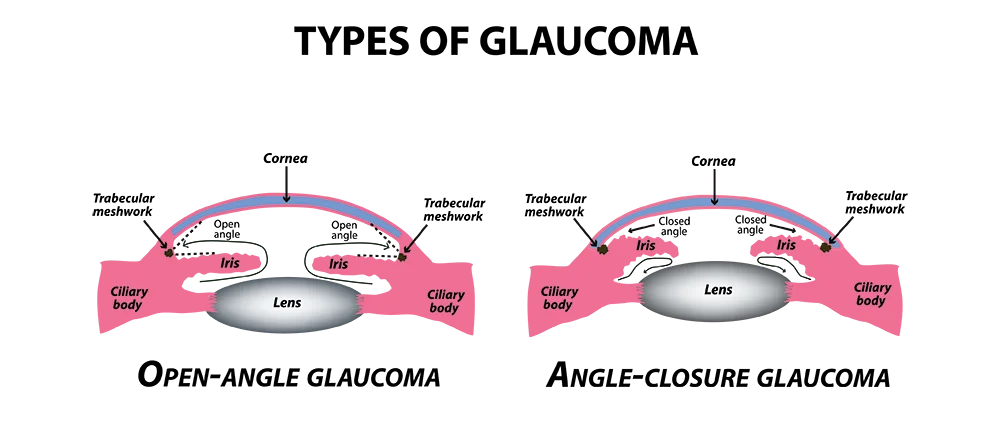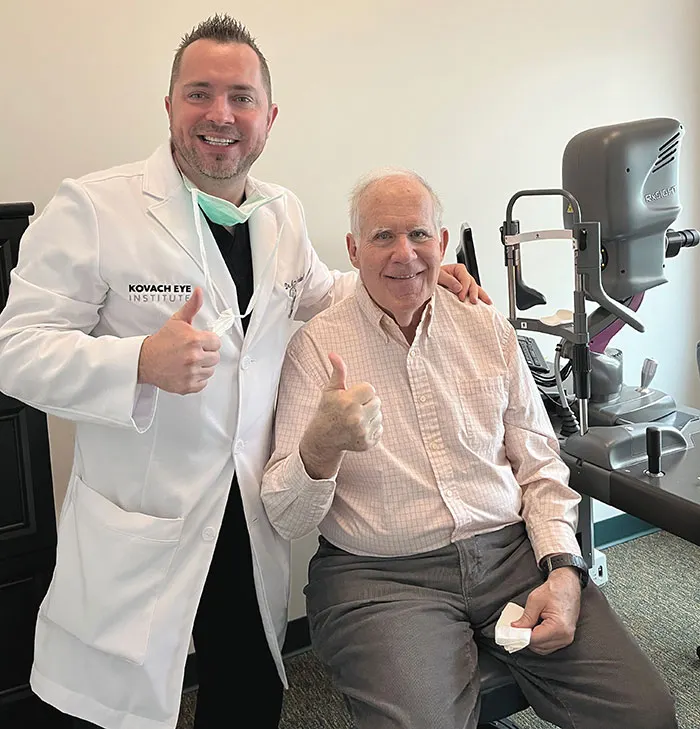Glaucoma Management & Surgery
What is Glaucoma?
Glaucoma is an eye disease that damages the optic nerve. Over 3 million people in the United States have glaucoma, and 200,000 more per year receive the diagnosis. It’s the leading cause of blindness for adults aged 60 and over. Glaucoma typically occurs when fluid builds in the front of the eye. This causes an increase in eye pressure that harms the optic nerve.
Glaucoma treatment is part of Kovach Eye Institute’s specialty services. Continue reading to learn more about the disease, and how we can help.
Who is at risk for Glaucoma?
Several risk factors can increase your chance of developing glaucoma, including:
- Family history of glaucoma
- Medical conditions like high blood pressure, heart disease and diabetes.
- Eye injuries
- Aged 60+ years, or 40+ years old for African Americans
- Descendant of African Americans, Russians, Japanese, Irish, Inuit’s, Scandinavians, or Latino Americans
- Have thinner corneas and higher optic nerve sensitivity
- Use of corticosteroids for prolonged periods
How is Glaucoma prevented?
Here are some suggestions for preventing glaucoma:
- Keep a healthy weight
- Eat a nutritious diet
- Maintain healthy blood pressure levels and keep other medical conditions under control
- Use prescription eye drops if you’re African American. This could cut your glaucoma risk in half.
Regular eye exams with an eye doctor are crucial when it comes to early diagnosis and treatment! Schedule your appointment today with one of our ophthalmologists.
What are the types of Glaucoma?
There are two main types:
Primary open-angle glaucoma is the most common form. Damage to the optic nerve is slow and painless, so many don’t know they have it until vision problems begin.
Angle-closure glaucoma is a less common form of glaucoma. If you have angle-closure glaucoma, see a doctor immediately! This is a medical emergency that affects vision from its onset.

What is the first sign of glaucoma?
With open-angle glaucoma, there are not usually any symptoms noticed at first. If there are any symptoms, there is gradual peripheral vision loss in both eyes. At advanced stages, people might experience tunnel vision.
Angle-closure glaucoma does have symptoms. These include:
- severe eye pain
- nausea or vomiting
- blurred vision
- sudden visual disturbances
- seeing halos around lights
- red eyes
Without treatment, angle-closure glaucoma can lead to blindness quickly.
Glaucoma Treatment
Your best treatment will depend on your unique case. Our team of eye doctors will test your eye health and disease progression. After this testing, we will make a treatment recommendation.
If laser surgery is the best option, there are a variety of procedures we can suggest. At Kovach Eye Institute, we can perform trabeculectomy, stent, iridotomy, or cyclophotocoagulation. All have the goal of releasing fluids from the eye to keep the eye pressure at normal levels.
How successful is glaucoma surgery?
Glaucoma laser surgery is highly effective and has excellent success rates. You can be confident with the experienced doctors at Kovach Eye Institute. Our surgeons and staff are devoted to providing the highest level of eye care and support.
How long does it take to recover from glaucoma surgery?
Laser glaucoma surgery patients may return to regular activities soon after the surgery. Patients may be advised to avoid activities like heavy lifting, bending or straining. This is usually only for a few weeks. Conventional glaucoma surgery normally requires 3 to 4 weeks of downtime. Rarely, it may mean several months for full healing.
Kovach Eye Institute will be there for you every step of the way. We’re happy to answer your questions and concerns while guiding you through the surgical process.
Get started on your path to healthy vision with our Comprehensive Ophthalmologists.
We have four convenient locations in Illinois: Elmhurst, Naperville, South Barrington and Lincolnwood. Schedule an appointment today by calling us at 630-833-9621 or request an appointment online.

The doctors at Kovach Eye Institute have either authored or reviewed and approved this content.
Page Updated: